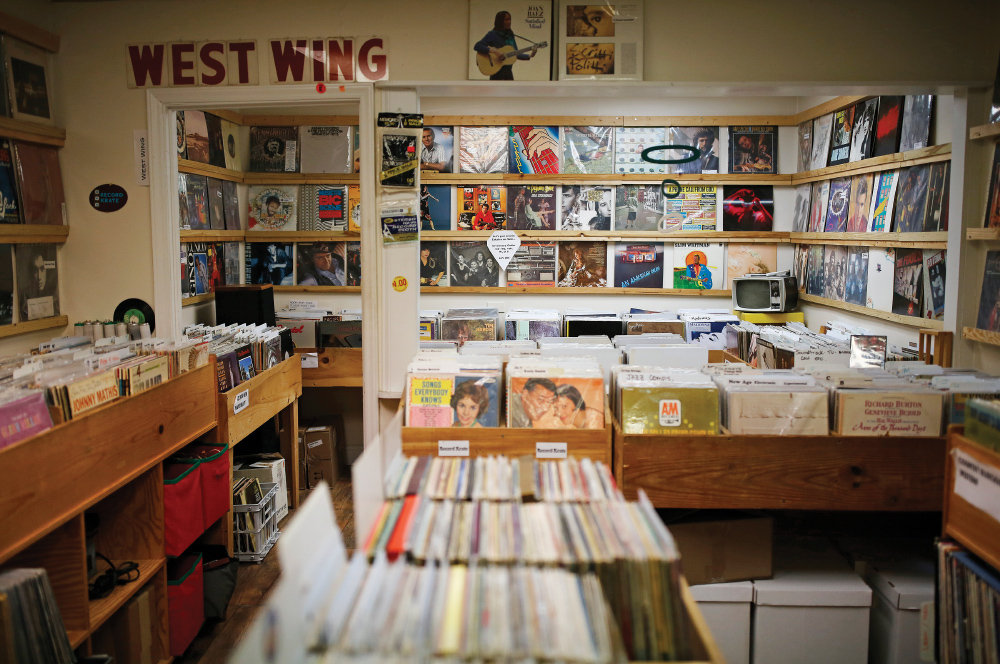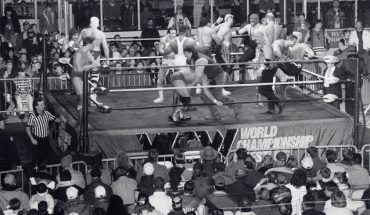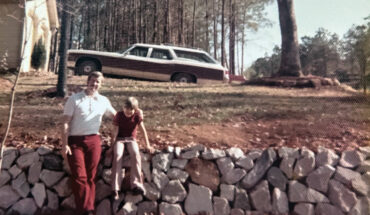A nationwide celebration of vinyl got its start right here in the City of Oaks with SchoolKids Records manager Michael Kurtz
by Billy Warden | photography by Eamon Queeney
“Wait!,” exclaimed the mop-topped man who would one day be a hero on several continents. “You know Todd Rundgren, but you don’t know Utopia? Oh, you gotta hear this!”
With that, store manager Michael Kurtz yanked a Duran Duran record off the turntable at Raleigh’s Schoolkids Records back when it was in Quail Corners Shopping Center, off Falls of Neuse Road. It soon bubbled with the synth-soaked hooks of Utopia, a side project for Rundgren, one of the high priests of experimental power pop.
Eclectic in both taste and personality, Kurtz played the part of pop professor with effortless elan. He laughed loud enough to drown out the tunes he spun. He knew every note Jimi Hendrix ever played. He led his own band, Three Hits, a regional pop favorite.
Such was the power of my record store matriculation that within a few years I was in a glam/ funk/punk group, The Floating Children, touring North Carolina with Kurtz and his ensemble. Afternoons spent browsing and bantering at Schoolkids or the now-defunct Record Exchange could, indeed, change lives.
And then this magic record store universe, this Hogwarts of groove, slipped into a seeming death spiral. CDs took off, which was fine; independent record stores sold CDs, too. But by the early 2000s, big-box stores like Target were cutting exclusive deals with labels to carry CDs with bonus material, often at steep discounts.
Meantime, the tech revolution meant that music shopping started to become something you could do on a computer. In a streaming world, who would need a store? And without a store — that de facto classroom-cum-community center-cum-church — what would happen to all that history and culture?
An existential panic gripped the once merry business, grimly underscored by the 2006 liquidation of the iconic Tower Records chain.
By that point, Kurtz was running the Music Monitor Network, a marketing co-op that loops together independent record stores from around the nation. There, he worked with Carrie Colliton, a record store veteran who’d moved from Virginia to the Triangle, bringing with her a reputation for throwing crackling in-store events with artists like the Lemonheads.
“When everyone was saying that record stores were doomed, it didn’t make sense to us because we were having weekly parties with artists. They were coming out to see the fans. We were having a great time and selling a lot of music,” Kurtz says. “In hindsight, that’s pretty much what happens on Record Store Day today.”
In September of 2006, Kurtz and Colliton rallied record store owners and others in the industry for a brainstorming and strategy conference at the inaugural SPARKcon, then a multiday, multivenue festival in downtown Raleigh. That gathering didn’t birth Record Store Day, per se, but, says Kurtz, “the seed was planted in Raleigh.”
The basic ingredients were to enlist a name-brand ‘ambassador’ (Metallica, Jack White, Chuck D) to fire up the faithful, line up in-store performances that connected with the local music scene, and offer exclusive vinyl releases from a wide array of artists (Paul McCartney to Gorillaz) featuring rarities and other special content. Vinyl seemed dead and buried in the early 2000s, but RSD’s founders saw in it a still-powerful mystique that would remind consumers why they first fell madly in love with record stores.
Like hisses and pops on a banged-up LP, though, skeptics abounded. Kurtz set out to smooth the grooves, relentlessly meeting, cajoling, and eventually persuading doubters at labels and management companies.
“Michael’s a thinker with a broad mind, but also personable — people like him immediately,” says Bryan Burkert, a fellow RSD pioneer and owner of Sound Garden Records. “In a relationship business, Michael’s been the heart and soul of this.”
Meanwhile, Burkert says, “Carrie makes all the trains run on time. Marketing, implementation, and logistics are Carrie.”
Logistics this year meant lassoing and crowning a planetary force of nature: Taylor Swift. As Variety put it, Swift’s coronation as RSD’s 2022 ambassador had “fans rapt with anticipation about what kind of exclusive vinyl release the pop superstar might be issuing for the event… just what Record Store Day organizers had hoped for.”
Colliton, though eyebrows deep in details and to-dos, savored the hubbub. “Holy cow,” she laughed to Variety, “the conspiracy theories have been so much fun.”
Since its humble origins during what many took to be the last gasp of a dying industry, RSD has cranked up the volume around the world. And at the same time, vinyl has surged: according to Billboard, in 2021 the format saw its fattest sales since 1991, with 41.72 million vinyl LPs sold in the United States. RSD estimates more than 2 million people participate in each year’s extravaganza. America’s 1,400 record stores enjoy new currency, as do an estimated 3,000 additional stores around the globe.
In 2013, Kurtz — who now resides in Bozeman, Montana — got word the government of France wanted to honor him as a Chevalier de L’Ordre des Arts et des Lettres (a knight of the Order of Arts and Letters).
The site of the ceremony, the sparkling resort of Cannes on the Riviera, was a long way from knockabout record stores. The crowd was a far cry from scruffy, eccentric musicians and store owners. The easy-going Kurtz hesitated.
“I dreaded it,” he recalls. “First, I don’t want to claim Record Store Day as my creation. This was a team effort. The other thing was, they wanted me to do my speech in French. But I can barely speak English!”
But, he says, “people told me to go, enjoy it, drink a lot of wine. In the end, they gave me a translator.”
What Kurtz said in his acceptance speech brought back all the warmth, wit, and bright-eyed belief that had inextricably upped the tempo of my life back at the old Schoolkids location in Quail Corners: “We have created a new future. One that respects the artists and rewards them for their art, just as the individual music fan is respected and rewarded. This is love.”
_________
This story originally appeared in the April 2022 issue of WALTER magazine




